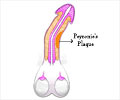Highlights
- Men who have a bent penis are at a higher risk of developing various cancers
- A gene could be behind the bent penis that could be associated with cancer, which can result in the bend
- Peyronie’s Disease affects men who are 40 years and above
Scientists in Houston, Texas had studied over 1.5 million men and presented the study at the American Society for Reproductive Medicine.
Men who had a bent penis were 10 percent more at risk of developing a tumor.
Dr. Pastuszak said, "The condition shared a common molecular pathway with Dupuytren’s disease, a hand deformity, and ledderhose disease, a thickening of tissue on the feet."
Nearly 42 percent of the participants were more likely to develop stomach cancer, about 20 percent more likely to develop skin cancer and 39 percent more prone to develop testicular cancer, revealed the research team.
Emma Shields, from Cancer Research UK, said: “It’s not yet fully understood what causes Peyronie’s disease and it’s possible it shares some similar risk factors to cancer."
Most men with Peyronie’s disease can have sex, but it would be difficult and painful for some.
Scientists say that treatment is not required, as the condition can fade on its own as well.
What is Peyronie’s disease?
Peyronie’s disease is a condition that causes curved, painful erections due to the formation of scar tissue, called as plaque inside the penis.
The disease can lead to difficulties in sexual intercourse and affects the intimate life of men.
Peyronie’s disease can be found in 1 to 23 percent of men who are in the age group of 40 and 70 years.
Men can visit a urologist who is a specialist in diagnosing and treating the disease. Making few lifestyle changes can help reduce these problems with erection linked to Peyronie’s disease.
Reference
-
Penile Curvature - (https://www.niddk.nih.gov/health-information/urologic-diseases/penile-curvature-peyronies-disease)
Source-Medindia














